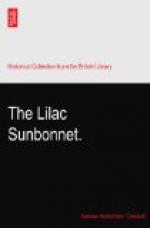“Then I do not care for anything else!” cried Winsome, clapping her hands. She had been resolving to learn Hebrew five minutes before.
“Nor do I, really,” said Ralph, speaking out the inmost soul that is in every young man.
As Ralph Peden sat looking at Winsome the thought came sometimes to him—but not often—“This is Allan Welsh’s daughter, the daughter of the woman whom my father once loved, who lies so still under the green sod of Crossthwaite beneath the lea of Skiddaw.”
He looked at her eyes, deep blue like the depths of the Mediterranean Sea, and, like it, shot through with interior light.
“What are you thinking of?” asked Winsome, who had also meanwhile been looking at him.
“Of your eyes, dear!” said Ralph, telling half the truth—a good deal for a lover.
Winsome paused for further information, looking into the depths of his soul. Ralph felt as though his heart and judgment were being assaulted by storming parties. He looked into these wells of blue and saw the love quivering in them as the broken light quivers, deflected on its way through clear water to a sea bottom of golden sand.
“You want to hear me tell you something wiser,” said Ralph, who did not know everything; “you are bored with my foolish talk.”
And he would have spoken of the hopes of his future.
“No, no; tell me—tell me what you see in my eyes,” said Winsome, a little impatiently.
“Well then, first,” said truthful Ralph, who certainly did not flinch from the task, “I see the fairest thing God made for man to see. All the beauty of the world, losing its way, stumbled, and was drowned in the eyes of my love. They have robbed the sunshine, and stolen the morning dew. The sparkle of the light on the water, the gladness of a child when it laughs because it lives, the sunshine which makes the butterflies dance and the world so beautiful—all these I see in your eyes.”
“This story is plainly impossible. This practical girl was not one to find pleasure in listening to flattery. Let us read no more in this book.” This is what some wise people will say at this point. So, to their loss will they close the book. They have not achieved all knowledge. The wisest woman would rather hear of her eyes than of her mind. There are those who say the reverse, but then perhaps no one has ever had cause to tell them concerning what lies hid in their eyes.
Many had wished to tell Winsome these things, but to no one hitherto had been given the discoverer’s soul, the poet’s voice, the wizard’s hand to bring the answering love out of the deep sea of divine possibilities in which the tides ran high and never a lighthouse told of danger.
“Tell me more,” said Winsome, being a woman, as well as fair and young. These last are not necessary; to desire to be told about one’s eyes, it is enough to be a woman.
Ralph looked down. In such cases it is necessary to refresh the imagination constantly with the facts. As in the latter days wise youths read messages from the quivering needle of the talking machine, so Ralph read his message flash by flash as it pulsated upward from a pure woman’s soul.




